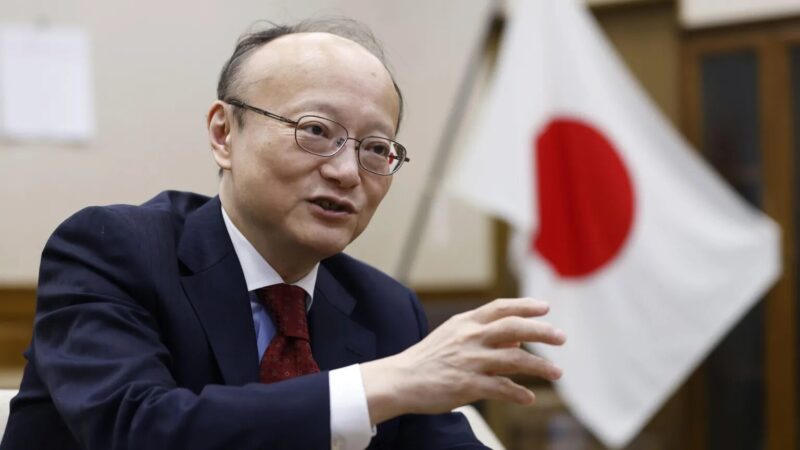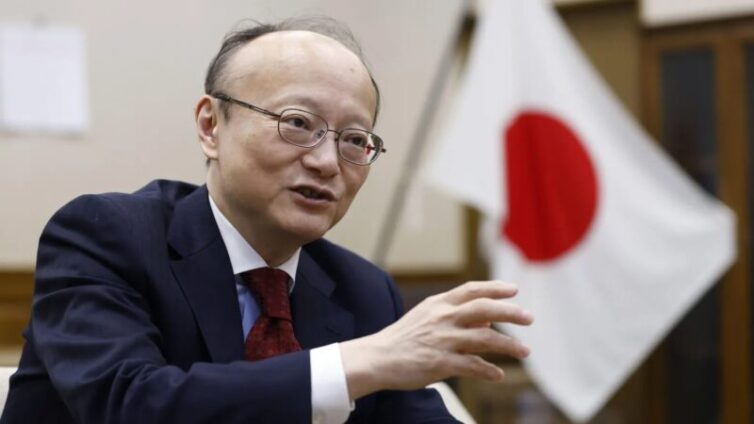For several years, Masato Kanda hardly slept.
"Three hours a night is an exaggeration," he laughs as he speaks to the BBC from Tokyo.
"I slept for three hours consecutively before being woken up but I then went back to bed, so if you add them up, I got a bit more."
So why was this 59-year-old bureaucrat's schedule so punishing?
Until the end of July, he was Japan's vice finance minister for international affairs, the country's top currency diplomat, or yen czar.
Key to the role was fending off currency market speculators that could trigger turmoil in one of the world's largest economies.
Historically, authorities intervened to weaken the value of the Japanese currency. A weak yen is good for exporters like Toyota and Sony as it makes goods cheaper for overseas buyers.
But when the yen plummeted during Mr Kanda's time in office it increased the cost of importing essential items like food and fuel, causing a cost of living crisis in a country more used to seeing prices fall rather than rise.
In his three years in the role, the value of the yen against the US dollar weakened by more than 45%.
To control the yen's slide, Mr Kanda unleashed an estimated 25 trillion yen ($173bn) to support the currency, marking Japan's first such intervention in almost a quarter of a century.
"The Bank of Japan and the Ministry of Finance are very clear. They intervene not at a particular level of the currency, but they intervene when market volatility is too much," says economist Jesper Koll.

Japan now finds itself on the US Treasury's watchlist of potential currency manipulators.
But Mr Kanda argues that what he did was not market manipulation.
"Markets should move based on fundamentals but occasionally they fluctuate excessively because of speculation, and they don't reflect fundamentals which don't change overnight," he says.
"When it affects ordinary consumers who have to buy food or fuel, that is when we intervened."
While countries like the US and UK can raise interest rates to boost the value of their currencies, Japan had for years been unable to put up the cost of borrowing due to the weakness of its economy.
Professor Seijiro Takeshita of the University of Shizuoka says Japan had no other option other than to intervene in the currency markets.
"It is not the right thing to do, but in my opinion, it is the only thing they can do."
The irony is that the yen's value jumped in recent months without Mr Kanda or his successor lifting a finger after the Bank of Japan surprised the markets with a rate hike, and the country got a new prime minister.
So was the $170bn bid to prop up the yen a waste of money?
No, says Mr Kanda and points out that his interventions actually made a profit although he emphasises that it was never a goal.
On whether or not his actions were ultimately successful he says: "It is not up to me to evaluate, but many say our exchange management stopped the excessive level of speculation."
Markets or historians should be the final judges, he adds.
After decades of economic stagnation, Mr Kanda also sounds an optimistic note about Japan's prospects.
"We are finally seeing investments and wages rising, and we have a chance to go back to a normal market economy," he says.
A more surprising legacy for this "humble public servant" is his becoming a star on the internet after Japanese social media users celebrated his ability to surprise financial markets with a series of AI-generated dancing videos.
7月末で辞める神田財務官
— 音速のGOX(2冠)
最後の為替介入
pic.twitter.com/MzfbuSQllX(@GOXGOXGOX2) July 11, 2024
Latest Stories
-
Frank Davies responds to critics: We’ll choose the method of protest in CJ’s case
20 minutes -
Ministers abandon parliamentary duties after appointment – Ayikoi Otoo laments
23 minutes -
Respect legal procedures in CJ’s removal – Frank Davies advises gov’t
28 minutes -
TUC calls for immediate repeal of L.I. 2462
33 minutes -
Enimil Ashon: Word to the wise, enough for Bawumia
34 minutes -
8 suspects arrested as police rescue victims in viral kidnapping incident
41 minutes -
Current constitutional processes for removing Chief Justice unfair – Sophia Akuffo
43 minutes -
5 killed in violent Nsawam sand dispute as police begin probe
54 minutes -
TUC congratulates Mahama on his massive election victory
56 minutes -
GAF to resume general releases of soldiers in May
56 minutes -
Push for AGOA extension or brace for mass job losses – Patrick Boamah tells government
2 hours -
Kenyan MP shot dead in ‘targeted’ attack in Nairobi
2 hours -
Telecel Healthfest uncovers hidden typhoid trend in Lawra
2 hours -
Mahama urges public sector workers to report wrongdoing of management
3 hours -
King Sunny Ade is safe, sound – Manager
3 hours

